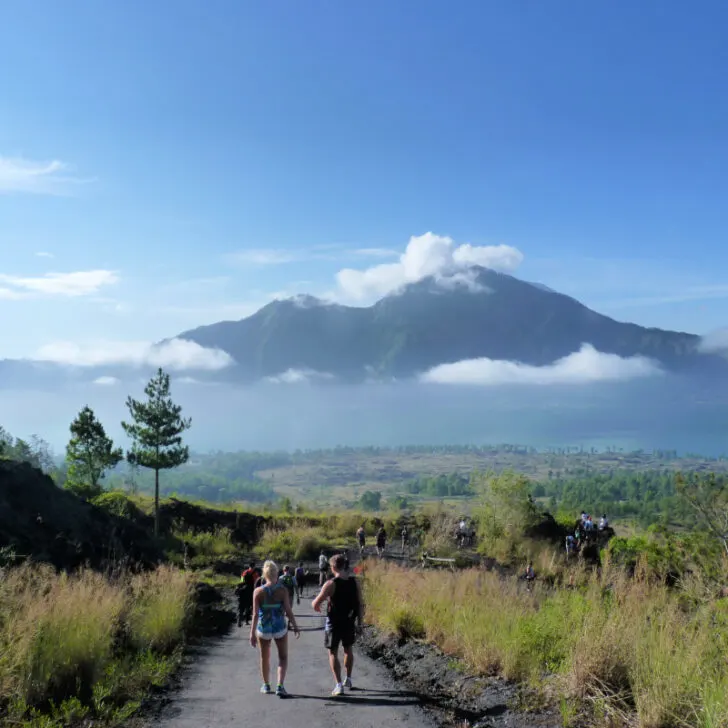
Ban Mountain Activities In Bali Triggers Huge Concerns
 Following the announcement of a blanket ban on all activities on all of Bali’s twenty-two mountains, including iconic Mount Batur and Mount Agung, local communities and tourists are making their feelings known.
Following the announcement of a blanket ban on all activities on all of Bali’s twenty-two mountains, including iconic Mount Batur and Mount Agung, local communities and tourists are making their feelings known.
Earlier this week, Bali’s Governor Wayan Koster announced that all activities on all of Bali’s mountains would be banned with immediate effect, ‘forever.’
This includes not only tourism activities for international visitors, but also domestic tourists and, most significantly, local people. [Main Article: Ban Mountain Activities In Bali]
This has triggered huge concerns for local communities and business owners whose lives and livelihoods are intimately connected to the mountains and volcanoes on the island.
Speaking to reporters, the Head of the Wangaya Gede Traditional Village, I Ketut Sucipto, explained his reasons for disagreeing with the new policy.
Situated close to the stunning Mount Batukaru, Wangaya Gede Traditional Village relies on income generated from tourism activities on the mountain.
He said, “I agree to keep chaste. But disagree when people should be banned. We have been fighting in the village for two years to keep the mountains and temples pure. This is suddenly a ban.”
Sucipto believes that an immediate ban is too extreme of a measure straight off the bat. He is calling on the government to consider implementing clearer and stricter regulations on activities on the mountain before enforcing the ban. [Main Article: Ban Mountain Activities In Bali]
He fears that by prohibiting tourists and even locals from visiting the mountains in Bali, there will be an immediate negative impact on tourism.
Sucipto said, “We ask the Governor, the Regional Police Chief, and the Regent to sit together first. Let them receive input from the lowest [level, from] those who know about the ins and outs of the existence of those mountains.”
He concluded, notably, that “foreign tourists have never polluted heaven” in and around Mount Batukaru in Tabanan Regency. [Main Article: Ban Mountain Activities In Bali]
Over in the communities surrounding Bali’s highest volcano, Mount Agung, trekking guides have been left blindsided by the announcement.
Trekking guide Komang Kayun urged the government to create solutions for the loss of income incurred by the ban.
Kayun said, “If climbing is not allowed, dozens of guides will automatically be unemployed. I have no other means of livelihood. If it is closed, the government and Governor must provide other solutions to guides. For example, the government should provide ten cows to be raised.” [Main Article: Ban Mountain Activities In Bali]
Just as communities in rural areas are starting to find their flow again in a post-pandemic world, the ban could be utterly devastating. It is not just the guides who have lost their jobs overnight, but small locally run tourism businesses like guesthouses and cafes will also suffer as a result.
Kayun continued “Don’t close [the mountains]. My family’s kitchen needs this. Imagine how many people will become victims if I become unemployed.”
Kayun, like Sucipto, agrees that changes to the way tourism on Bali’s most popular mountains are managed need to be made, but the simple tightening of regulations could garner more impactful and aligned results. [Main Article: Ban Mountain Activities In Bali]
Prominent Balinese entrepreneur and social justice advocate Ni Luh Djelantik has also added her input to the calls to revoke the ban.
A translation of Djelantik’s reads, “My advice applies new rules regarding tariffs, guide standardization, cleanliness, courtesy standards, safety. Copy the rules applied in other areas. [It’s] not the activity of climbing that [should] be prohibited but the rules that must be enforced and [consequences for] violators must be strict.”
What does this all mean for tourists planning their visits to Bali? For now, it looks like the ban could stick.
Although it remains to be seen if the growing pressure that is being applied by local leaders and communities in Bali will be enough to encourage the provincial government to reconsider what can and cannot be done on the mountains.
The ban will unduly leave those thousands of prospective travelers to Bali brokenhearted. The sunrise hike of Mount Batur is consistently one of the most highly rated and in-demand travel experiences on the island. [Main Article: Ban Mountain Activities In Bali]
Officials In Bali Are Urging Everyone To Report Tourists Who Are Behaving Badly
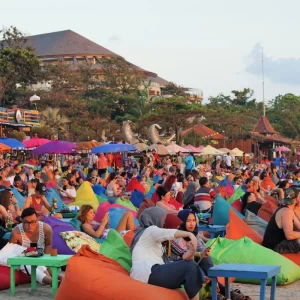 The Governor of Bali, Wayan Koster, has called on local people to urgently report any and all incidences of foreigners behaving badly on the island.
The Governor of Bali, Wayan Koster, has called on local people to urgently report any and all incidences of foreigners behaving badly on the island.
The call for action from the provincial leader comes as part of a bigger effort to crack down on unruly behavior from foreigners and promote high-quality tourism on the island.
Speaking at a press conference on Sunday, 28th May, Governor Koster was clear that he wants local residents to formally report any and all incidents they may observe of foreigners breaking the law or acting disrespectfully towards Balinese culture.
Governor Koster stated clearly to reporters in Denpasar that “Bali residents are prohibited from facilitating foreign tourists who wish to commit activities that are inconsistent with their visa permits or the provisions of law.” [Main Article: Ban Mountain Activities In Bali]
Suggesting that not reporting violations unto itself is a form of complicity and facilitation on the part of local people.
The provincial leader continued his requests of the local people. He said, “Bali residents are obliged to report on foreign tourists’ activities that are inappropriate [legally or culturally] or inconsistent with their visa permits to the local police, immigration office, the Public Order Security Agency [Satpol PP], pecalang [Balinese traditional village security] and tourism office.”
Following an incident in Ubud where a foreigner experienced a mental health crisis and interrupted a cultural performance, local tourism stakeholders were measured in their dialogue, noting that the incident should be taken as an opportunity to ‘step forward’. [Main Article: Ban Mountain Activities In Bali]
Though there was outrage and disbelief at the incident online, those responsible for cleansing the temple following the incident were keen to move forward in a positive manner.
Governor Koster has himself noted that cracking down on tourist behavior and his series of proposed policy changes are something of a ‘double-edged sword’ that can be traced back to the broadening of the post-Covid visa on arrival program.
He said that, on the one hand, the visa on arrival could make it easier for foreigners to visit Bali and has helped accelerate Bali’s economic recovery. [Main Article: Ban Mountain Activities In Bali]
On the other hand, the visa on arrival, which is now available to citizens from 92 countries, is viewed by some as something of an open-door policy despite the IDR 500,000 price tag.
The visa on arrival, according to Governor Koster, also makes it easier for foreigners who are “not of good quality” to come to Bali and engage in unwanted behavior.
He told reporters on Sunday evening that the actions of the provincial government come as a response to the actions of international tourists.
 Governor Koster noted that the plans to implement a comprehensive policy on tourism governance in Bali are in full flow.
Governor Koster noted that the plans to implement a comprehensive policy on tourism governance in Bali are in full flow.
He acknowledged that the crackdown on badly behaved tourists risks being counterproductive, especially as many tourism businesses in Bali are still in the process of recovering from the impacts of the pandemic. [Main Article: Ban Mountain Activities In Bali]
The provincial government wants to see policy changes and more rigorous implementation of existing laws to ensure that high-quality tourism prevails in Bali and that local culture and customs are preserved and respected.
Governor Koster said that more proactive enforcement of policies would ensure that the issue is tackled across the board on a case-by-case basis.
He added, “We will enact this comprehensive policy on tourism governance in Bali in the coming weeks.”
Much of what the policy will cover has already been alluded to during announcements over the last few weeks.
Despite the rapid developments on the policy front, the Indonesian Minster for Tourism and Creative Economies has reassured tourists that the red carpet will still be rolled out for their arrival, noting that tourists are welcome on the Island of the Gods.
Governor Koster concluded, “We will immediately hold a meeting with the central government to address and evaluate the Visa on Arrival policy so that its implementation does not make Bali tourism seem cheap tourism.” [Main Article: Ban Mountain Activities In Bali]
Governor Of Bali Formally Bans Tourists Hiring Mopeds Directly From Locals
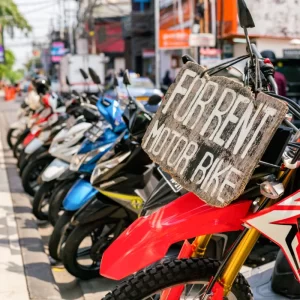 The Governor of Bali has made a series of announcements that will heavily impact travelers planning their trip to the island.
The Governor of Bali has made a series of announcements that will heavily impact travelers planning their trip to the island.
In the last few weeks, the provincial government has proposed a ban on all tourists driving on the island; following a press conference on Sunday evening, Governor Wayan Koster has taken the first steps in formalizing the ban. [Main Article: Ban Mountain Activities In Bali]
Back in mid-March, Governor Koster made a series of monumental announcements that proposed changes to the way in which tourists could experience the island.
The first was a proposed revocation of the visa on arrival for Russian and Ukrainian citizens, which has not been implemented.
The second was the deployment of a task force whose mission is to crack down on foreigners breaking the conditions of their visas by working illegally and operating businesses without a license. [Main Article: Ban Mountain Activities In Bali]
The third proposal was, perhaps, the most impactful of all for tourists. Governor Koster announced in March that he wanted to ban all foreigners from driving in Bali.
This proposed policy would include foreign tourists and ex-pats and would ban any non-Indonesians from driving motorcycles or cars on the island.
Late on Sunday, 28th May, Governor Koster made a further set of announcements, including the first steps in bringing this ban on tourists driving in Bali into law.
The initial legislative change, as laid out by Governor Koster in March, would require all foreigners to hire a private driver for all their transportation needs. This ban would mean that tourists in Bali could not hire a moped to explore the island, irrespective of whether they had an international or even local driving license. [Main Article: Ban Mountain Activities In Bali]
Governor Koster said, “Those tourists have to travel, walk, and use cars to travel. It is no longer allowed to use a motorcycle or anything that is not from a travel agent.”
This announcement was received with a mix of responses from both locals and frequent visitors to Bali. Some local motorcycle rental owners urged the provincial government to rethink the ban.
Other regular tourists, digital nomads, and ex-pats in Bali began asking how the process would work, noting that in many popular areas of the island, this would trigger extreme traffic congestion.
The ban, in its initial proposed form, would also then make it even harder for tourists to use GoJek and Grab services since these online taxi services are not recognized as formal travel agents.
On Sunday, Governor Koster called local residents in Bali to play their part in ensuring that tourists obey the rules and regulations of the island.
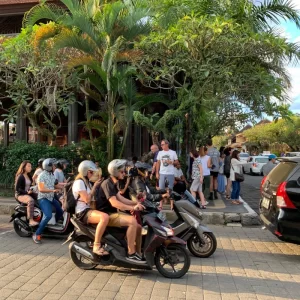 He said he urged local residents not to facilitate foreigners in committing acts that violate both Indonesian law and local Balinese customs. [Main Article: Ban Mountain Activities In Bali]
He said he urged local residents not to facilitate foreigners in committing acts that violate both Indonesian law and local Balinese customs. [Main Article: Ban Mountain Activities In Bali]
Governor Koster told reporters, “Bali residents are prohibited from facilitating foreign tourists who wish to commit activities that are inconsistent with their visa permits or the provisions of law.”
In specific reference to the hiring of motorcycles, Governor Koster said that local residents who are not formally registered as members of trade agencies or the transportation renting association are not permitted to rent two-wheeling vehicles to foreign tourists.
This is huge news, both for local people and for tourists. While there are hundreds of companies that are part of the transportation renting association in Bali, there are just as many informal operations renting motorcycles to tourists, digital nomads, and ex-pats in Bali. [Main Article: Ban Mountain Activities In Bali]
These more informal motorcycle rental enterprises provide many families with their basic income and come as a result of huge investments and loans.
Moving forward, until any further ban on tourist driving is written into legislation, tourists can only hire a motorcycle from a business that is registered with the relevant trade agencies or the transportation renting association in Bali.
Tourists cannot simply rent a motorcycle from a guesthouse owner, local friend, or rental owner who is not a formally registered motorcycle rental company.
Tourists must also have an international driving license that covers them for driving motorcycles and relevant insurance documents.
Traffic police across Bali are working in conjunction with the tourism task forces to crack down on tourists violating the rules of the road. This comes as part of a bigger, island-wide commitment to establish higher-quality tourism in Bali. [Main Article: Ban Mountain Activities In Bali]
Increasingly Expensive Flight Tickets Could Hinder Travelers’ Plans To Visit Bali
 Bali is anticipating 2023 to be the biggest year for tourism since the pandemic began. The island has set a target to welcome 4.5 million international tourists by the end of the year.
Bali is anticipating 2023 to be the biggest year for tourism since the pandemic began. The island has set a target to welcome 4.5 million international tourists by the end of the year.
While travel data predictions show Bali is on track to hit tourism targets this year, expensive airfares are beginning to threaten the goal.
Bali wants to welcome 4.5 million international tourists in 2023; the island also wants to welcome millions more domestic tourists from around Indonesia. [Main Article: Ban Mountain Activities In Bali]
Bali’s Governor, Wayan Koster, has voiced his concerns that expend airfares may be hindering tourists, both domestic and foreign, from visiting the island.
Speaking during a press conference in the popular tourist resort of Legian, Governor Koster shared his concerns about flight prices.
He said, “Investigation has to be [completed] because flights to Bali are quite expensive, and airlines to Bali have not returned to normal as before the pandemic.”
Data reveals that Bali is currently receiving up to 13,000 domestic tourists per day, yet before the pandemic, this figure was sitting at a consigned 25,000 daily domestic arrivals. The cost of flights is proving to be a limiting factor for both domestic and international tourists. [Main Article: Ban Mountain Activities In Bali]
On the popular Facebook group Bali Bogans, a forum dedicated to Australian travelers planning their trips to Bali, group members have been sharing screenshots of rising ticket prices.
Many comments revealed that Australians are increasingly concerned about flight costs, which is starting to jeopardize their trip planning.
Officials from Bali Airport have confirmed that between January and April 2023, I Gusti Ngurah Rai Airport served 3.23 million international passengers and 2.83 million domestic passengers, totaling over six million passengers in just four months.
As of May 12, 2023, Bali Airport operates a total of 29 international flight routes served by 36 airlines. [Main Article: Ban Mountain Activities In Bali]
The topic of flight availability and flight cost and their impact on travel trends and the economy in Bali is never far from public dialogue.
Earlier in the year, Indonesia’s Minister for Tourism and Creative Economies Sandiaga Uno, hosted a press conference and spoke about how he plans to recession-proof tourism in the country.
He noted that as the global economy continues to shift and many countries experience a cost of living crisis, tourism in Indonesia would have to prepare for a few more storms even after the pandemic.
Minister Uno stated clearly that increased flight availability would help ensure that plane tickets remain affordable for travelers. [Main Article: Ban Mountain Activities In Bali]
Minster Uno said that more direct flights to Bali would help ensure travelers had more affordable choices available to them as they plan their trips to the island.
He explained, “There have been several foreign direct flights from Qatar and Dubai that have already delivered. We also want additions from Singapore and several ASEAN countries. This is what we are trying to do in the first quarter of this year in collaboration with airlines and the Ministry of Transportation.”
There are many ways that travelers can reduce their ticket costs. The day of travel hugely impacts flight cost, as well as whether the flight is direct or requires layovers.
Many credit cards give exclusive ticket rates, and of course, airmails go a long way in reducing ticket costs too.
Just as Minster Uno suggested, flights from the Middle East to Bali are proving increasingly popular irrespective of increasing ticket costs. [Main Article: Ban Mountain Activities In Bali]
In just a matter of days, Gusti Ngurah Rai will welcome, for the first time, the world’s biggest commercial plane.
Operational plans to safely manage the Emirates A380 Airbus into Denpasar have been underway for months. The General Manager of Angkasa Pura I, Handy Heryudhitiawan, has been sharing regular updates with the media as the excitement grows for this inaugural landing of the jumbo jet in Bali.
This week airport teams have cleaned the runway and surrounding airport grounds to ensure that everything will run smoothly on June 1st when Emirates comes into land.
Heryudhitiawan said life at the airport is busy and that he and his teams remain committed as ever to passenger safety and traveler experience.
He shared, “Aircraft movements with an average daily rate currently reach 30,133 passengers and 166 aircraft movements. With this significant movement, it becomes a reference for us to continue to work on improving flight safety.” [Main Article: Ban Mountain Activities In Bali]
Vibes In Bali Starting To Feel More Positive After A Turbulent Few Weeks For Tourism
 This week’s announcement about another new tourism task force being set to work in Bali has been received positively by the tourism sector in Bali.
This week’s announcement about another new tourism task force being set to work in Bali has been received positively by the tourism sector in Bali.
Following the deployment of a task force designed to crack down on foreigners breaking their visa conditions, the provincial government launched another group assigned to ensure that tourism activities are mutually beneficial for visitors and life on the island. [Main Article: Ban Mountain Activities In Bali]
Speaking to reporters about the Task Force for the Acceleration of Bali Tourism Governance, the chairman of one of Bali’s tourism stakeholder groups, Putu Winastra, shared his praise for the initiative. He said, “The task force formed by the governor is very good.”
Winastra shared that the deployment of the task force will help hold anyone who is behaving outside of the law or cultural norms of Bali will be held to account.
He noted that the presence of the task force creates a formal channel for rule breakers to be bought to justice in a timely manner.
Winastra explained it as a fairer and more formal progress “because there must be two sides, not only tourists but also the industry.” [Main Article: Ban Mountain Activities In Bali]
He further explained, “This task force is very important in the framework of implementing and actualizing the enforcement of regulations together with relevant stakeholders.”
Officials have also announced that proposed policy changes that will affect tourism in Bali are still in the pipeline.
They confirmed that the proposed legislation changes must undergo rigorous legal processes and socialization before they are passed into law. [Main Article: Ban Mountain Activities In Bali]
In the interim, the Task Force for the Acceleration of Bali Tourism Governance has their boots on the ground to ensure that tourists and tourism operators are behaving legally and culturally respectfully.
He continued to share that he hoped the task force would be a permanent working group dedicated to ensuring high-quality tourism prevails in Bali.
He continued, “Don’t be [this commitment] reversed; in fact, if left unchecked (not disciplined), it will have a negative effect on tourists who really really want to travel or take a vacation and enjoy Bali. Because it will cause inconvenience.”
Speaking on behalf of the Bali Tourism Village Communication Forum, I Made Mendra Astawa said, “Especially now, Bali tourism is currently in the recovery phase. Do not let unscrupulous tourists act [in a disorderly way], which could damage the image of Bali as a world tourist destination.” [Main Article: Ban Mountain Activities In Bali]
This week an incident at Saraswati Temple in Ubud hit international headlines. A young woman from German suffered an episode of ill mental health that prompted her to interrupt a cultural performance at the palace.
This incident caused great offense and concern to locals and tourists alike, and while a cleansing ritual has already taken place, immigration has announced that the woman will be deported when it is safe for her to fly.
While the woman is now receiving treatment at a specialized mental health facility in Bali, her actions left tourism stakeholders asking how such an incident could have happened in the first place.
Cok Wah, the owner of the temple, told reporters that the incident posed an opportunity for reflection and improvement. [Main Article: Ban Mountain Activities In Bali]
He shared, “[this must result in a] step forward. We are more selective, and we are increasing security. Decades after the performance has been going on, this is the first time something like this has happened. We have to make it an evaluation material.”
The handling of this case has demonstrated that a proactive and collaborative approach is still needed between officials, tourism operators, and tourists in Bali.
After weeks of heightened tensions, increasing outrage online, and a series of monumental policy change proposals, the way in which the incident was handled at Saraswati Temple and the positive feedback about the deployment of the Task Force for the Acceleration of Bali Tourism Governance can be taken good news for tourists. [Main Article: Ban Mountain Activities In Bali]
New Trend Of Tourists Staying Less Time In Bali
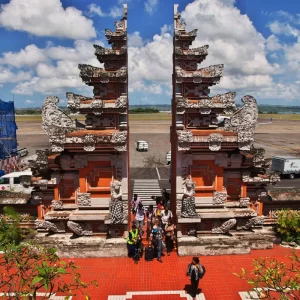 Newly released travel data shows that tourists visiting Bali are spending less time on the island than they have in previous years. But why?
Newly released travel data shows that tourists visiting Bali are spending less time on the island than they have in previous years. But why?
The Island of the Gods is as stunning as it has always been and more accessible than ever before, so why are tourists spending less time?
The Head of the Bali Provincial Tourism Office, Tjokorda Bagus Pemayun, has been discussing travel data with reporters. He was able to confirm that before Covid-19, the average number of foreign tourists visiting per day was around 15,000.
Currently, around 12,361 international arrivals are landing at I Gusti Ngurah Rai Airport daily. [Main Article: Ban Mountain Activities In Bali]
Pemayun suggested that there are a number of reasons why tourists are staying for less time in Bali than before the pandemic.
He began his explanation by saying, “The Governor is targeting quality and dignified tourists…The most important thing is to respect Balinese cultural customs.”
When asked to quantify what a quality tourist would look like, Pemayun suggested that one example of a quality tourist is someone who travels using the services of a travel agent and a private driver. [Main Article: Ban Mountain Activities In Bali]
This is a clear nod to Governor Koster’s proposed ban on tourists driving in Bali, a move that would require visitors to hire a private driver through a government-approved travel agent.
Irrespective of anyone’s description of a ‘quality tourist,’, travel data clearly shows that the average international visitor to Bali is spending less time on the island.
Pemayun revealed, “If you look at the immigration data, the average is seven days; we expect 14 days to 21 days; in 1990, it was 21 days.”
But why? One immediate answer is the accessibility of travel and the normalization of international travel. In the 1990s, it was a real mission to visit Bali from anywhere in the world.
While travel between Bali and Australia was beginning to become widely accessible 1990s, the introduction of low-cost airlines in South East Asia in the regions leading transportation hubs in the last 10-15 years has made it easier than ever before for travelers to visit the island. [Main Article: Ban Mountain Activities In Bali]
What data shows is that travelers appear to be spending less time on the island; however, it could also be interpreted that there are just as many people staying for the long trips but that there is an increasing number of people visiting Bali overall compared to the 1990s.
This is exactly what tourism leaders in Bali have been working for for years, and it is a positive thing. The rise of social media and travel content creators over the last ten years has helped put Bali firmly in the minds of international travelers from all over the world.
Everyone wants to visit Bali for as long or as short of a time as they have available.
The average stay for tourists in Bali being reduced to an average of seven days is partly because It’s easier to get in and out of the island. Both long-haul and short-haul travel are quicker and more affordable than at any other time in history. [Main Article: Ban Mountain Activities In Bali]
So, of course, international travelers, especially expats, are hopping from neighboring cities, Singapore or Kuala Lumpur, or Bangkok, to Bali for the weekend or a quick week out of the office.
Similarly, it is easier than ever for Australian travelers, consistently the island’s most frequent international visitors, to nip over for a week of sea, sand, and sunshine. Regular flight deals and international promotion of Bali as a travel destination.
Officials in Bali have been vocal about their desire to attract more tourists from China, Japan, and India to the island this year. Travel data shows that generally, travelers from China and Japan, in particular, will travel for 4-6 days before returning home.
It is absolutely understandable that tourism stakeholders in Bali want to see tourists stay longer on the island. Stay longer, and spend more; that is the crux of what tourism leaders want to see from ‘quality’ tourists to the island. And it is easier than ever for tourists to stay for a decent amount of time in Bali.
Indonesia’s visa on arrival costs just IDR 500,000 and is valid for 30 days. This visa can be extended for a further 30 days meaning that international arrivals are welcome to explore Bali and Indonesia’s other incredible islands for a solid two-month period.
3 Destinations In Bali Named Amongst The Best In Indonesia
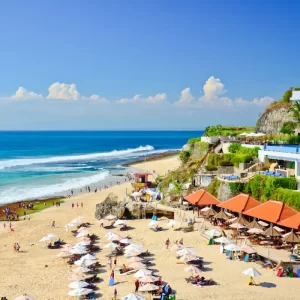 Every year the Indonesian Tourism Board hosts the Indonesian Tourism Village Award. This year not one but three truly unusual destinations in Bali have been shortlisted for the prestigious award.
Every year the Indonesian Tourism Board hosts the Indonesian Tourism Village Award. This year not one but three truly unusual destinations in Bali have been shortlisted for the prestigious award.
The Minister for Tourism and Creative Economies has been in Bali this week, visiting the shortlisted destinations and shining a light on why international visitors will be blown away by what each has to offer.
The three destinations featured on the shortlist are Serangan Tourism Village in Denpasar City, Manistutu Tourism Village in Jembrana Regency, and Kenderan Tourism Village in Gianyar Regency.
Bali is divided into nine administrative regions known as regencies. Badung Regency receives the most amount of tourism interest and is home to leading resort destinations like Canggu, Uluwatu, Nusa Dua, Kuta, Legian, and Seminyak.
The three tourism villages up for the national award each offer something memorable, unique, and (to use Minister Uno’s words) Instragrammable about them.
Each is easily accessible from Bali’s bigger and more well-known destinations and makes for fantastic day trips for holidaymakers of every travel style.
Speaking from Serangan Village, Indonesia’s Minster for Tourism and Creative Economies, Sandiaga Uno shared his affection for the coastal retreat. He described the tourism experiences on offer at Serangan as ‘world-class.’
He added, “What is very, very memorable and Instagramable as well as being fantastic is the procession of releasing the [turtle] hatchlings. And this is a symbol of sustainable development.”
For beach lovers, Serangan Village offers everything tourists could wish for; a pristine stretch of coastline, quaint resorts, and plenty of coves and shallow shorelines to explore. That’s before we mention the truly break-taking sunsets. [Main Article: Ban Mountain Activities In Bali]
Serangan Village is just a quick 20-minute drive from I Gusti Ngurah Rai International Airport and an equally quick drive from central Kuta and chilled-out Sanur.
Whether you’re a returning traveler to Bali looking for somewhere new to explore or a first-time visitor seeking a beach getaway close to all the action (but free from the hustle), Seragan Village is a great shout.
The next unique destination to be shortlisted for the Indonesian Tourism Village Awards is Manistutu Tourism Village in Jembrana Regency.
West Bali is about to undergo a huge tourism redevelopment, and Manistutu is setting the standard high for where the region is heading in terms of tourism experience.
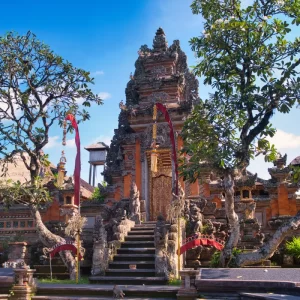 Speaking to reporters, the Regent of Jembrana shared his love of Manistutu Village and his hopes for how the attention the awards brings will help introduce the area to more tourists.
Speaking to reporters, the Regent of Jembrana shared his love of Manistutu Village and his hopes for how the attention the awards brings will help introduce the area to more tourists.
He said, “Tourist villages in Jembrana definitely have selling points for tourists. Tourist visits also mean an increase in the community’s economy.”
He continued, “With all of our hard work, I hope Manistutu can win the Indonesian Tourism Village Award.” [Main Article: Ban Mountain Activities In Bali]
Local tour guide Ketut Master told reporters that nature lovers will adore what Manistutu has to offer. Master said, “We invite visits to plant trees and other nature-loving activities.”
Tourism Villages is the term used for both small and newly established tourism experiences across Indonesia, but it is not exclusively grassroots efforts.
Tourism villages is a term also used to describe bigger resorts, like Kuta Village and Legian Village, both of which are Bali’s major hotspots. [Main Article: Ban Mountain Activities In Bali]
Kendra Tourism Village in Gianyar Regency sits just north of central Ubud and is already a popular destination with international and domestic tourists alike.
For many visitors, Kenderan Tourism Village is already considered an extension of Ubud itself.
Home to some of the finest jungle resort hotels in Bali and a stunning jungle landscape that is just waiting to be explored, Kenderan Tourism Village is a serious contender for the Indonesian Village Tourism Awards 2023.
Whatever the result, the huge amount of attention that these three unique destinations will get as the competition rolls on will mean that the crowds are already on their way.
If you want to be amongst the pioneer tourists to discover these hidden gems, get yourself to Bali soon! [Main Article: Ban Mountain Activities In Bali]
New Tourist Guide Will Be Given To All Visitors On Arrival In Bali
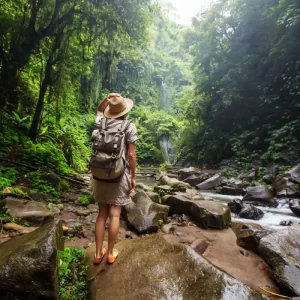 Officials in Bali have confirmed that the new good tourist guide will be handed to tourists as they pass through immigration at the island’s airport.
Officials in Bali have confirmed that the new good tourist guide will be handed to tourists as they pass through immigration at the island’s airport.
The guide, in the form of an information card, will be given to all international arrivals landing at I Gusti Ngurah Rai when it is published in the next few weeks.
As tourists land at Bali Airport, they are welcomed with views of the island’s vast beaches, expansive jungle, and a glimpse of Denpasar city. [Main Article: Ban Mountain Activities In Bali]
In the coming weeks, when tourists are stamped into Indonesia, they will not only receive a visa sticker in their passport but also an information card outlining the do’s and don’ts of travel on the island.
The much anticipated good tourist guide has been talked about by the island’s leading officials for weeks and comes as part of a bigger mission to ensure that Balinese unquiet culture and heritage are preserved and celebrated within tourism on the island.
Following an apparent rise in unruly behavior by some foreigners on the island, officials have been keen to be proactive in ensuring such actions are stamped out.
Speaking to the media, the Head of the Regional Office of the Bali Ministry of Law and Human Rights, Anggiat Napitupulu, explained that the information card will give tourists arriving on the island a clear outline of what is and isn’t acceptable behavior during their visit. [Main Article: Ban Mountain Activities In Bali]
He explained, “The card will be created and handed over at Immigration so that the Immigration can tuck the card into the foreigner’s passport when they land at I Gusti Ngurah Rai Airport.”
The good tourist guide is being created in partnership with the Bali Tourism Office, the Provincial Government, and the Ministry of Law and Human Rights, who work alongside immigration authorities.
Napitupulu continued, “We have had several meetings. The tourism office is formulating the [copywriting]. So, it will be either in the form of a pocket-sized sheet or a card. The card contains what is allowed and what is not allowed to be done in Bali.”
He also gave an update about the billboards that were announced earlier this year. Napitupulu shared that a number of sites have been identified for the information signboards that will also contain the do’s and don’t of how to behave in Bali. The billboards will display the guidelines for tourists in English, Russian, and in Hindi.
News that the good tourist guide will be handed directly to every visitor arriving in Bali comes just days after Bali’s Deputy Governor suggested further novel solutions to prevent bad behavior from tourists.[Main Article: Ban Mountain Activities In Bali]
 Deputy Governor Tjokorda Oka Artha Ardana Sukawati, who is also known as Cok Ace, suggested that billboards or posters be displayed at sites where tourists have been caught disobeying the law or cultural norms.
Deputy Governor Tjokorda Oka Artha Ardana Sukawati, who is also known as Cok Ace, suggested that billboards or posters be displayed at sites where tourists have been caught disobeying the law or cultural norms.
Cok Ace suggested that rather than naming and shaming violators in the media, which comes with potential human rights and privacy issues, the provincial government should install signage outlining the nature of violations in such places and the nature of the consequences to violators.
So, for example, at the famous Kayu Putih temple tree, a signboard would be installed outlining how a foreigner was caught posing inappropriately for photos in the roots of the tree and was subsequently deported for violating the law on public indecency and behaving in a sacrilegious way at a holy site for Balinese Hindus.
The good tourist guide is set to be a valuable resource for tourists, especially for those who are visiting Bali or even Asia for the first time. [Main Article: Ban Mountain Activities In Bali]
The guide is set to outline tourist etiquette for visiting temples, reminders about the laws on driving in Indonesia, cultural taboos, and tips on how to make the most of a trip to Bali, including attending traditional ceremonies and trying local food.
A similar resource has already been shared by the national tourism board, Wonderful Indonesia, which received good feedback.
Last week, as commentary in some online spaces was beginning to suggest that tourists were thinking twice about visiting the island in light of recent announcements regarding policy changes for tourists and cracking down on behavior, the Indonesian Tourism Minster shared his reassurances.
Minister for Tourism and Creative Economies Sandiaga Uno assured tourists planning their trip to Bali that the red carpet will continue to be rolled out.
He also vowed that any policy changes affecting tourism in Bali and across Indonesia would be subject to rigorous assessment before being written into legislation. [Main Article: Ban Mountain Activities In Bali]
Bali Announces Crack Down On Foreigners Using Cryptocurrency For Payments

Crypto currency background with various of shiny silver and golden physical cryptocurrencies symbol coins, Bitcoin, Ethereum, Litecoin, zcash, ripple.
Bali’s Governor Koster has made a series of announcements that will have huge impacts on tourists visiting Bali in a variety of ways.
On Sunday, 28th May, Governor Koster announced a formal ban on foreigners using cryptocurrency in Bali, as well as new changes to the way in which tourists can hire vehicles and report complaints.
While cryptocurrency is booming and increasingly widely accepted, especially in digital nomad hubs and emerging economies like Costa Rica, officials in Bali have made it clear that using digital currencies for payments on the island is illegal.
During a press conference on Sunday evening, Governor Koster announced a crackdown on foreigners using cryptocurrency for payments on the island. [Main Article: Ban Mountain Activities In Bali]
This is an all-encompassing ban, meaning tourists and foreign investors cannot use cryptocurrency as a means of payment at tourism attractions, hotels, restaurants, shops, or for any kind of goods or services.
Governor Koster was clear when he announced that “foreign tourists who behave inappropriately, do activities that are not allowed in their visa permit, use crypto as a means of payment, and violate other provisions will be dealt with firmly.”
It’s not just a cryptocurrency that Governor Koster wants to see handled with more firm action, but also foreigners who are conducting business without the correct permits, visas, and business licenses.
The issues, as Governor Koster presented them, have become synonymous with one another in many cases.
Governor Koster conveyed to the press that “strict actions range from deportation, administrative sanctions, criminal penalties, closure of business premises, and other tough sanctions for anyone caught violating the financial and immigration laws of Indonesia”. [Main Article: Ban Mountain Activities In Bali]
He added, “Violations of the obligation to use Rupiah will be subject to administrative sanctions in the form of a written warning, the obligation to pay fines, and a ban on participating in payment traffic.”
The press conference was also attended by a number of key officials from Bali, including the Chief Inspector of Bali Police, General Putu Jayan Danu Putra, and the Head of Bank Indonesia for Bali, Trisno Nugroho.
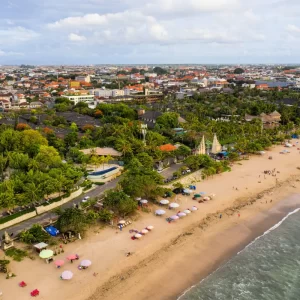 Nugroho confirmed that while cryptocurrency is legal in Indonesia in the form of an asset, it is banned as a method of payment and transaction.
Nugroho confirmed that while cryptocurrency is legal in Indonesia in the form of an asset, it is banned as a method of payment and transaction.
He explained further, “The Bank of Indonesia will not hesitate to impose sanctions on parties found using non-cash payment instruments other than Rupiah, including the use of digital assets in the form of Crypto.”
Governor Koster continued, clearly outlining the law regarding foreign business exchanges. The details are worth being reminded of whether tourists, digital nomads, ex-pat, potential investors, or business owners in Indonesia. [Main Article: Ban Mountain Activities In Bali]
Koster said, “[those] who carry out foreign exchange business activities without permission from the Bank Indonesia can be punished with a minimum of one year up to a maximum of five years and a minimum fine of Rp50 million (US$3,300) and a maximum of Rp22 billion (US$1.4 million).”
For the majority of tourists, the formal ban and announcement of a crackdown on cryptocurrency may be of little interest.
What this particular announcement does highlight, however, is how seriously and how quickly the Bali Provincial government is working to make changes to legislation to ensure that the Acceleration of Bali Tourism Governance is enforced across the board.
Last week the Head of the Bali Tourism Office, Tjokorda Bagus Pemayun, announced that a second specialist task force had been deployed in Bali to help crack down on foreigners breaking the law and disrespecting cultural norms on the island.
Speaking to reporters at the announcement of the Task Force for the Acceleration of Implementation of Tourism Governance, Pemayun said, “This task force does not only supervise foreigners or tourists but supervises and controls all tourism activities, as well as public order related to tourism.”
While the task force will likely be focusing more directly on tourists behaving badly, the aim is to ensure that tourism operators across the island are playing their part in ensuring tourists have access to the information and resources they need for a respectful, enjoyable, and fulfilling stay on the island.